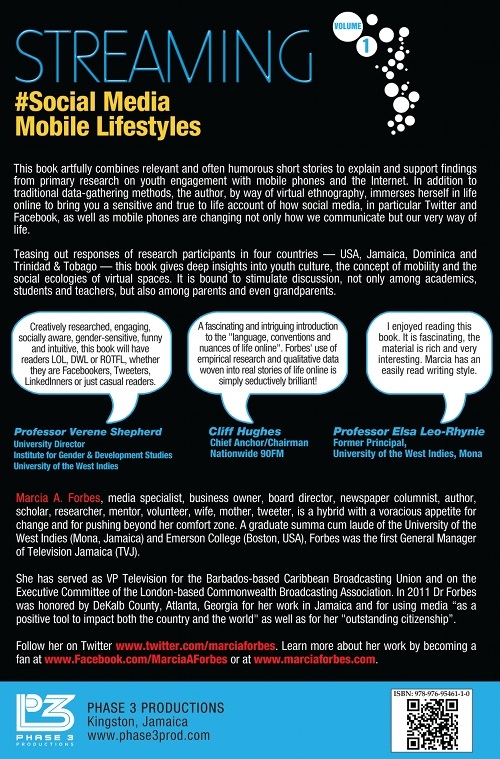The following is the latest in a series of excerpts from Dr Marcia Forbes’ new book, “Streaming: Social Media, Mobile Lifestyles,” published in Caribbean Journal.
By Marcia Forbes, PhD
Naturally curious and adventuresome, some adolescents will use Facebook to seek out new ways of expressing themselves.
Behind the screens of whatever devices they use – whether mobile phones, tablets, laptops or desk tops – some take on identities that are different from those presented in real life, face-to-face encounters.
There is nothing inherently bad or wrong with this.
Problems arise, however, when these identities infringe on the rights of others and cause emotional scars such as can result from cyberbullying and stalker behaviour.
The insensitivity of some Facebook practices and comments can cause significant emotional distress to teens who are not yet mature enough to deal with them. These include changing a Facebook status from ‘in a relationship’ to ‘single’ without first notifying one’s partner.
That was the fate of a 22-year-old Master’s in Business Administration student in Bangalore, India who, having learnt of their break-up via her boyfriend’s change of status on Facebook, committed suicide.[i]
Making public certain types of information via Facebook such as break-ups can expose the aggrieved to public ridicule and scorn. Even mature adults have difficulties coping with these kinds of exposures, far less adolescents.
The ways in which friendship is performed via Facebook warrants fulsome discussion but will not be dealt with in this volume. One does have to save some juicy bits for later J.Teens spoke in depth on this subject in terms of how online friends are chosen, what a Facebook friend means and much more. Suffice it to say here that Facebook is the cause of substantial relationship challenges for males and females, young and not so young.
In a chapter titled, “Marriage Dun Mash Up” (Marriage Already Destroyed), Miller (2011,7) provides insight into how this played out for a couple in Trinidad. He captures the intensity of the wife’s Facebook interrogations, the husband’s frustrations and the resulting strains wrought on their marital relations.
“However much time Marvin spends on Facebook, there is one person he knows who spends even more time on it, and that is his wife….she spends much of it on his Facebook account. She monitors everything he does. She wants to know who this friend is, how he knows her and what she means to him….To his mind, this is now tantamount to being stalked by his own wife, leading to endless repetitive justifications following accusations, day after day. This has turned into an obsession, a relentless pursuit that has worn him down.”[ii]
This Trinidadian couple is not unique. Adolescents and adults, males and females, also experience stalker-type behaviors via Facebook and elsewhere online. It is not only by those of the opposite sex. As one woman remarked via Twitter, “My female stalker just sent me this, ‘I want to do bad things to you to make you feel good.’”
[i]“Dumped on Facebook, IIM Bangalore Student Commits Suicide”, The Times of India, September 20, 2011.
[ii] See Daniel Miller, Tales from Facebook, Polity Press, 2011.
This book, the first of a two part series, is available in hard copy as well as various eBook formats. Download your Kindle copy here. STREAMING is also available here.
This book, the first of a two part series, is available in hard copy format and also as an eBook at Amazon.com. Wider distribution via a variety of eReaders is coming soon.
